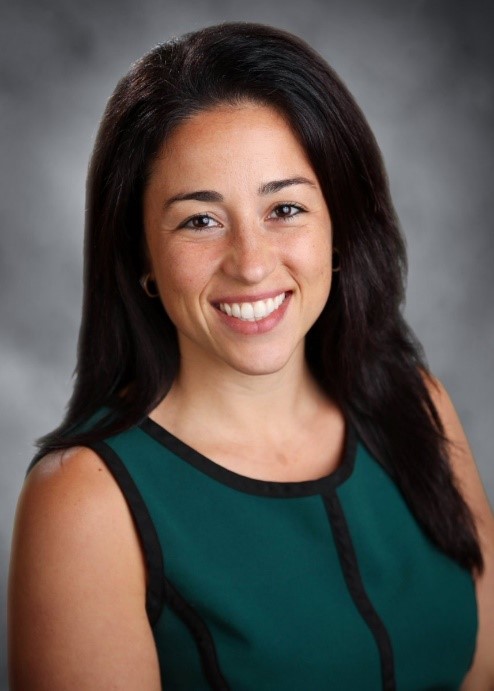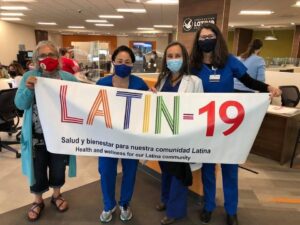
After receiving an interdepartmental PhD in Nursing, Epidemiology, and Psychology from the University of Miami, Rosa Gonzalez-Guarda took a position there as an assistant professor. In 2016, Gonzalez-Guarda moved to Durham, NC, where she now works as an associate professor at Duke University School of Nursing. In addition to her leadership role on the RADx-UP Coordinating Center, she also serves as the co-director of the Community Engagement Core at Duke’s Clinical Translational Science Institute.
Her quotes have been edited for clarity and brevity.
You gave a talk recently on building community partnerships and you used online dating as a metaphor for relationship building within communities. Can you walk me through some of the similarities you mentioned?
Gonzalez-Guarda: My parents have a beautiful marriage, and I’ve learned a lot about relationship building through their lens. My parents have a business together, so they are not only partners in terms of their relationship, but also business partners. And my dad said that very early on that they decided that they were two bodies, but they wanted to be one soul.
In my work with relationship building, I really feel that when we start to blur the lines between the community and the academic partners, that’s where the magic happens in terms of the potential impact we can have. It’s when people don’t know what entity you are from. They just see you as part of a team.
Very much like dating, it’s really important when you’re establishing a relationship to really understand the context of that individual or that community or that problem that you’re working on. And in doing that, it’s really important to really study the profile and ask important questions about them. Both parties need to do this. The community partner needs to really study the academic partner and the academic partner really needs to gain a deep understanding of the community.
SHARE

Media Archive
This is a short description of the Media Archive subsection of the site.
What was it like building relationships with communities in Miami versus here in Durham?
Gonzalez-Guarda: In Miami, the Latinx community is a majority. We represent over 61% of the population. Doing work in that context is very different than working here in North Carolina, where the Latinx community is a much, much smaller segment of the population.
“I’ve never been able to establish a partnership without help from gatekeepers.”
Rosa Gonzalez-Guarda co- leads the RADx-UP Engagement Resource Center. Read how she applies lessons from love in community partnership building.
In Miami, because there’s such a substantial amount of Latinx individuals in leadership positions, a lot of those systems are inclusive by design. Here, the context is very different, there’s exclusion by design, right? It’s an afterthought, oftentimes.
So, on top of thinking about the population and the systems and services that surround them, it’s really important to understand – what are the established stakeholders and the relationships? And what are the evolving stakeholder groups that are working in those areas? Because those are going to be important partners and friends and allies.
You also mentioned that the two universities had pretty different relationships with their communities when you arrived. Can you tell me how you dealt with that context in each place?
Gonzalez-Guarda: I worked at the University of Miami. It’s a newer university. It didn’t have that history that more established academic health centers in other parts of the country have, such as Duke, where there is a history of feeling disenfranchised and used by that academic institution. So, I had to learn very quickly around distrust and those kind of relationships as part of the context of that relationship building.
Part of the relationship building phase is really, I think about matchmaking… A lot of times we meet people because peers are introducing us, they see that we have some areas in common and they want to connect us. My experience has always been that those kinds of matchmakers and connectors are really important. I’ve never been able to establish a partnership without help from gatekeepers. I have learned there are different levels of matchmaking, from connecting individuals with common interests, to connecting institutions or movements in the communities such as coalitions.
So once you’ve made those connections and started to form those bonds, how do you sustain a relationship long-term?
Gonzalez-Guarda: It’s really thinking about how to be present beyond the ask and the self-interest that we have. So for me, as a nurse scientist and academic, of course, I have self-interest in the kind of research that I’m interested in and making sure that we advance that science, and that along the way we are able to obtain funding for that research and disseminate our work.
But if I would just show up in community spaces just for those purposes, I wouldn’t be investing in the kind of relationship that could be sustainable long-term. And what I have learned is the importance of being able to go where the community is driving you. Being responsive to immediate community concerns is also critical.

Can you give an example of a time community needs or feedback shaped the work that you do?
Gonzalez-Guarda: During the COVID-19 pandemic, I’ve actually been doing a lot less research than I’m used to doing because there has been such a critical need to be responsive to the direct needs of individuals. So for example, instead of writing grants and papers I have been part of direct advocacy and community service such as providing vaccinations to the Latinx community during the pandemic. That has been part of investing in that long-term relationship. Importantly though, I have learned so much from these experiences that I can later bring to my research.
What is your role in RADx-UP?
Gonzalez-Guarda: I am a faculty lead of the Engagement Resource Center. I work with a group of people who work to bring together resources —project profiles, explainer videos, one-page handouts, study results— around community engagement, testing, and data to support projects and their partners. The ERC is a digital library that serves as a central collection of RADx-UP resources and valued external resources to be shared with RADx-UP projects and the broader scientific and lay communities. Our goal is to ensure resources are appropriate for sharing across the RADx-UP community, are relevant to the program, and are responsive to the diverse needs of the RADx-UP projects. The success of the resource library is in the partnerships we have around the country and the bidirectional sharing of good information.
In a parallel role and similar to my role leading the research committee of LATIN-19 (Latinx Interdisciplinary Network for COVID-19), I am the chair of the RADx-UP Engaging Hispanic/Latino/Latinx Populations Working Group. We are a small coalition within the larger RADx-UP consortium working to share best practices around communication and outreach, COVID-19 testing and vaccination, as well as data collection and dissemination. We also advocate for inclusive practices the help engage this population in COVID-19 research and public health efforts.
Find useful resources and learn more about RADx-UP.
Aplicando lecciones de amor a las asociaciones comunitarias: preguntas y respuestas con la directora de compromiso comunitario de la Aceleración Rápida del Diagnóstico en Poblaciones Desfavorecidas, Rosa Gonzalez-Guarda
Después de recibir un doctorado interdepartamental en Enfermería, Epidemiología y Psicología de la Universidad de Miami, Rosa Gonzalez-Guarda se desempeñó como profesora adjunta. En 2016, Gonzalez-Guarda se mudó a Durham, NC, donde ahora trabaja como profesora adjunta en la Facultad de Enfermería de la Universidad de Duke. Además de su función de liderazgo en el Centro de Coordinación de la Aceleración Rápida del Diagnóstico en Poblaciones Desfavorecidas, también se desempeña como codirectora del Centro de Compromiso Comunitario en el Instituto de Ciencias Clínica Traslacionales de Duke.
Sus citas han sido editadas por motivos de claridad y brevedad.
Hace poco habló sobre la creación de asociaciones comunitarias y utilizó las citas en línea como metáfora para establecer relaciones dentro de las comunidades. ¿Puede explicarme algunas de las similitudes que mencionó?
Gonzalez-Guarda: Mis padres tienen un hermoso matrimonio y he aprendido mucho sobre cómo construir relaciones a través de su visión. Mis padres tienen un negocio juntos, por lo que no solo son “socios” en términos de su relación, sino también socios comerciales. Mi papá dijo que en una etapa temprana de ese proceso decidieron que si bien eran dos cuerpos, querían ser una sola alma.
En mi trabajo con el desarrollo de relaciones, realmente siento que cuando comenzamos a desdibujar las líneas entre la comunidad y los socios académicos, ahí es donde sucede la magia en términos del impacto potencial que podemos tener. Cuando las personas no saben de qué entidad es uno. Simplemente lo ven como parte de un equipo.
Al igual que en una cita, cuando se establece una relación es muy importante entender el contexto de la otra persona, de la comunidad o del problema en el que se está trabajando. Y al hacerlo, es realmente importante estudiar el perfil y hacer preguntas importantes sobre la otra persona. Ambas partes deben hacer esto. El socio comunitario tiene que estudiar realmente al socio académico y el socio académico realmente necesita obtener una comprensión profunda de la comunidad.
¿Cómo ha sido construir relaciones con las comunidades de Miami en comparación con las de aquí en Durham?
Gonzalez-Guarda: En Miami, la comunidad latina es mayoría. Representamos más del 61 % de la población. Trabajar en ese contexto es muy diferente que trabajar aquí en Carolina del Norte, donde la comunidad latina es un porcentaje mucho, mucho más pequeño de la población.
“Nunca he podido establecer una sociedad sin la ayuda de facilitadores”.
Rosa González-Guarda es colíder del Centro de recursos de participación de RADx-UP. Lea cómo aplica las lecciones de amor a las asociaciones comunitarias.
En Miami, debido a que hay una cantidad sustancial de personas latinas en posiciones de liderazgo, muchos de esos sistemas son inclusivos desde que son diseñados. Aquí, el contexto es muy diferente, hay exclusión desde el diseño, ¿verdad? A menudo la inclusión es algo que viene como añadidura.
Entonces, además de pensar en la población y los sistemas y servicios que los rodean, es realmente importante comprender: ¿cuáles son las partes interesadas y las relaciones establecidas? ¿Y cuáles son los grupos interesados y en desarrollo, que trabajan en esas áreas? Cuál es la importancia de socios, amigos y aliados?.
También mencionó que las dos universidades tenían relaciones bastante diferentes con sus comunidades cuando llegó. ¿Puede decirme cómo abordó ese contexto en cada lugar?
Gonzalez-Guarda: Trabajé en la Universidad de Miami. Es una universidad más nueva. No tenía ese historial que tienen los centros de salud académicos más establecidos en otras partes del país, como Duke. Aquí hay antecedentes de sentirse desprotegido y utilizado por esa institución académica. Así que tuve que aprender muy rápidamente sobre la desconfianza y ese tipo de relaciones como parte del contexto de esa construcción de relaciones.
Creo que parte de la fase de desarrollo de relaciones es, en realidad, como en las coincidencias al buscar pareja... Muchas veces conocemos gente porque alguien nos presenta, ven que tenemos algunas áreas en común y quieren conectarnos. Mi experiencia siempre ha sido que esos tipos de formadores de parejas y conectores son realmente importantes. Nunca pude establecer una sociedad sin la ayuda de facilitadores. He aprendido que hay diferentes niveles de emparejamiento, desde conectar a personas con intereses comunes, hasta conectar instituciones o movimientos en las comunidades, como las coaliciones.
Entonces, una vez que ha establecido esas conexiones y ha comenzado a formar esos lazos, ¿cómo mantiene una relación a largo plazo?
Gonzalez-Guarda: Realmente se trata de pensar en cómo estar presente más allá de la pregunta y el interés propio que tenemos. Entonces, para mí, como enfermera científica y académica, por supuesto, tengo interés en el tipo de investigación que me interesa y en asegurarnos de que avancemos en esa ciencia, y en la forma en que podamos obtener financiación para esa investigación y difundir nuestro trabajo.
Pero si me presentara en los espacios comunitarios solo para esos fines, no estaría invirtiendo en el tipo de relación que podría ser sostenible a largo plazo. Y lo que he aprendido es la importancia de ir a donde la comunidad te esta dirigiendo. Responder a las inquietudes inmediatas de la comunidad también es fundamental.

¿Puede dar un ejemplo de una ocasion en la que las necesidades de la comunidad o sus opiniones determinaron el trabajo que usted hace?
Gonzalez-Guarda: Durante la pandemia del COVID-19, he estado haciendo mucha menos investigación que antes porque ha habido una necesidad crítica de responder a las necesidades directas de las personas. Por ejemplo, en lugar de redactar publicaciones y aplicaciones, he formado parte del apoyo directo y el servicio comunitario para proporcionar vacunas a la comunidad latina durante la pandemia. Esto ha sido parte de invertir en esa relación a largo plazo. Sin embargo, es importante destacar que he aprendido tanto de estas experiencias que más adelante podre hacer uso del conocimiento adquirido para aportar a mi investigación.
¿Cuál es su función en RADx-UP?
Gonzalez-Guarda: Soy líder académico del Centro de recursos para la participación communitaria. Trabajo con un grupo de personas que trabajan para reunir recursos (perfiles de proyectos, videos explicativos, folletos de una página, resultados de estudios) en torno a la participación comunitaria, pruebas y datos para respaldar proyectos y sus socios. El ERC es una biblioteca digital que sirve como colección central de recursos de RADx-UP y recursos externos valiosos para compartir con proyectos de RADx-UP y las comunidades científicas y no científicas más amplias. Nuestro objetivo es garantizar que los recursos sean adecuados para compartirlos en toda la comunidad de RADx-UP, sean relevantes para el programa y respondan a las diversas necesidades de los proyectos de RADx-UP. El éxito de la biblioteca de recursos se encuentra en las asociaciones que tenemos en todo el país y el intercambio bidireccional de buena información.
En una función paralela y similar a mi función como líder del comité de investigación de LATIN-19 (Red Interdisciplinaria de Latinx para el COVID-19, Latinx Interdisciplinary Network for COVID-19), soy presidente del Grupo de Trabajo de vinculación de Poblaciones Hispano/Latino/Latino de RADx. Somos una coalición pequeña dentro del consorcio más grande de RADx-UP que trabaja para compartir las mejores prácticas en torno a la comunicación y la alcance, las pruebas y la vacunación contra el COVID-19, así como la recopilación y la difusión de datos. También abogamos por prácticas inclusivas, que ayuden a involucrar a esta población en la investigación del COVID-19 y los esfuerzos para la salud pública.
Encuentre recursos útiles y obtenga más información sobre RADx-UP.

Grants
Upcoming opportunities to apply for funding.

Resources
Explore our library of resources for researchers and the general public.

Publications
Explore our dashboard of recent RADx-UP scholarship.

